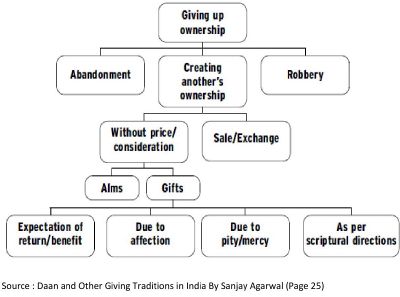Difference between revisions of "Dana (दानम्)"
(editing) |
|||
| Line 10: | Line 10: | ||
देवब्राह्मणादिसम्प्रदानकद्रव्यमोचनम् . तत्पर्य्यायः . त्यागः २ विहापितम् ३ उत्सर्जनम् ४ विसर्जनम् ५ विश्राणनम् ६ वितरणम् ७ स्पर्शनम् ८ प्रतिपादनम् ९ प्रादेशनम् १०निर्व्वपणम् ११ अपवर्जनम् १२ अंहतिः १३ .इत्यमरः | देवब्राह्मणादिसम्प्रदानकद्रव्यमोचनम् . तत्पर्य्यायः . त्यागः २ विहापितम् ३ उत्सर्जनम् ४ विसर्जनम् ५ विश्राणनम् ६ वितरणम् ७ स्पर्शनम् ८ प्रतिपादनम् ९ प्रादेशनम् १०निर्व्वपणम् ११ अपवर्जनम् १२ अंहतिः १३ .इत्यमरः | ||
| − | Defining Dana, Shri. Sanjay Agarwal<ref>Agarwal, Sanjay. (2010) ''Daan and Other Giving Traditions in India.'' New Delhi: AccountAid, India</ref> says dana is a sub-set of giving. It is only the last item - 'giving - as per scriptural directions' that qualifies as proper danam. | + | == Definition of Dana == |
| − | + | [[File:Dana and Other Giving Traditions in India By Sanjay Agarwal-1.jpg|right|frameless|400x400px]] | |
| − | + | Defining Dana, Shri. Sanjay Agarwal<ref>Agarwal, Sanjay. (2010) ''Daan and Other Giving Traditions in India.'' New Delhi: AccountAid, India</ref> says dana is a sub-set of giving. It is only the last item - 'giving - as per scriptural directions' that qualifies as proper danam. According to him the most comprehensive definition of Dana appears to have seven essential elements. | |
| + | # Donar | ||
| + | # Receiver | ||
| + | # Respectful transaction | ||
| + | # Appropriate object for donation | ||
| + | # Right place | ||
| + | # Right time | ||
| + | # Right procedure | ||
== References == | == References == | ||
Revision as of 15:00, 30 April 2018
Dana (Samskrit : दानम्) is the tradition of 'giving away' or 'donation' without expecting any return' is practiced widely in the world as 'philanthropy', has largely been driven by traditional faith-based motivation while the practice of purpose-based or secular giving is slowly gaining ground in the present day society. Traditionally the act of 'giving' involved a complex and variegated thought process of people who 'gave' in many forms (water, food, money) following rituals (shraddha, yajnas), themes (annadana, vratas, digging of wells for public welfare), ways (gupt daan : unknown to anyone, visible to everyone), times (kartika masa) and methods (scriptural procedures).
Etymology
The word Dana is derived from the dhatu 'दा' दाने with the following given in Nighantu used to mean 'giving' 'distribution' 'bestowing' ' presentation' 'generous' etc.
दाति दाशति दासति राति रासति पृणक्षि पृणाति शिक्षति तुञ्जत मंहते इति [ दश ] दानकर्माणः। २० । (Nighantu 3.20) [1]
Amarakosa defines Dana as the dravya (material) given away to devatas, brahmanas and others and is summarized as : Tyaga (त्यागः । giving up), Vihapitam (विहापितम् a gift) Utsarjana (उत्सर्गः donation), Visarjana (विसर्जनम् giving away) Visrananam (विश्राणनम् donation) Vitarana (वितरणम् giving up), Sparshana (स्पर्शनम् a gift)
देवब्राह्मणादिसम्प्रदानकद्रव्यमोचनम् . तत्पर्य्यायः . त्यागः २ विहापितम् ३ उत्सर्जनम् ४ विसर्जनम् ५ विश्राणनम् ६ वितरणम् ७ स्पर्शनम् ८ प्रतिपादनम् ९ प्रादेशनम् १०निर्व्वपणम् ११ अपवर्जनम् १२ अंहतिः १३ .इत्यमरः
Definition of Dana
Defining Dana, Shri. Sanjay Agarwal[2] says dana is a sub-set of giving. It is only the last item - 'giving - as per scriptural directions' that qualifies as proper danam. According to him the most comprehensive definition of Dana appears to have seven essential elements.
- Donar
- Receiver
- Respectful transaction
- Appropriate object for donation
- Right place
- Right time
- Right procedure
